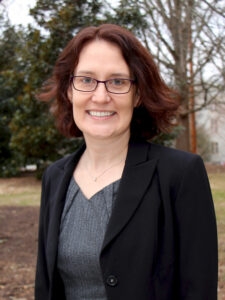Dr. Heather Govenor
PHD FELLOW GRADUATE | Global Change Center
VT Graduate December 2017, Biological Systems Engineering
Advisors: Drs. Leigh-Anne Krometis & Cully Hession
hgovenor@vt.edu
Heather joined the Biological Systems Engineering Department in January 2014 under the co-advisement of Drs. Leigh-Anne Krometis and Cully Hession and completed her dissertation in 2017. She earned her BS in Biology from Penn State and her MS in Entomology with a specialization in Ecology from Michigan State University. For as far back as she can remember, Heather has been interested in the interactions of living things with their environments. She spent many weekends of her childhood exploring caves and rock climbing hot spots with her sister and dad, which exposed her first-hand to the awesomeness of the natural world. She is fascinated with the dichotomous fragility and resilience of nature.
Heather’s MS thesis evaluated the impacts of abiotic (e.g., light, nutrient) and biotic (e.g., prior season’s defoliation) stressors on the defensive chemistry and growth of deciduous trees and the health of the insects feeding on those trees. Since the completion of her MS, Heather has been working as an ecological risk assessor, identifying potential hazards to the environment from chemical stressors, and working with geologists, chemists, and engineers to determine appropriate remedial actions to protect ecological resources.
Heather’s dissertation research focused on the impacts of fine sediment on aquatic macroinvertebrate community health and related policy implications for sediment management under the Clean Water Act. Sediment input into aquatic systems has increased with human population growth, urbanization, and habitat disturbance, and sediment is the second largest stressor to surface waters nation-wide based on both human use and environmental impacts. Although sediment is commonly implicated as a major physical stressor to aquatic life, there are substantial gaps in our understanding of fine sediment fate and transport dynamics and the mechanistic basis for aquatic life impairments. By addressing some of these knowledge gaps, Heather’s work examined the potential effectiveness of current sediment management approaches, contributed to advances in watershed modeling for biological effects, and provided insight into appropriate best management practices to reduce environmental health impacts. She completed her Ph.D. program in December 2017.
Heather believes that the largest threat to global health is humanity, and hopes to contribute to policy decisions that balance the needs of civilization with sustainable practices. Having a background in applied ecology and environmental consulting, Heather has seen the benefits of working in interdisciplinary teams and of approaching challenges from diverse perspectives. She enjoyed being part of the Interfaces of Global Change IGEP while at Virginia Tech, where she developed collaborative relationships with colleagues from a range of specialties, and obtained an improved understanding of how the multiple facets of global change manifest and interact.
Last updated July 2021.






